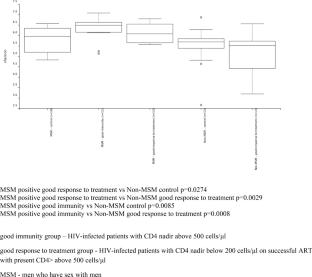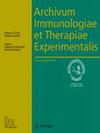Gut Microbiota Diversity in HIV-Infected Patients on Successful Antiretroviral Treatment is Linked to Sexual Preferences but not CD4 Nadir
Abstract
The effects of HIV infection and antiretroviral therapy (ART) on the gut microbiome are poorly understood and the literature data are inconsistent. The aim of this study was to assess the alpha and beta diversity of the fecal microbiota in HIV-infected patients on successful antiretroviral therapy with regard to sexual preferences and CD4 nadir. Thirty-six HIV-infected ART-treated patients with HIV viremia below 20 copies/ml and CD4 > 500 cells/μl were divided into two subgroups based on CD4 nadir. The composition of the intestinal microbiota was assessed by 16SrRNA sequencing (MiSeq Illumina). The alpha and beta diversity were analyzed according to CD4 nadir count and sexual preference. Several alpha diversity indexes were significantly higher in the MSM group than in heterosexual patients. The alpha diversity did not differ significantly between patients with CD4 nadir > 500 cells/μl and CD4 nadir < 200 cells/μl. Beta diversity was also associated with sexual preference. A significant difference in Weighted Unifrac was observed between all MSM and all non-MSM participants (p = 0.001). The MSM group was more diverse and demonstrated greater distances in Weighted Unifrac than the non-MSM group. The relative abundance of the Prevotella enterotype was higher in the MSM than the non-MSM group. Sexual preferences demonstrated a stronger influence on alpha and beta diversity in HIV-infected patients following successful antiretroviral treatment than HIV infection itself. The observed lack of association between CD4 nadir and alpha and beta diversity may be caused by the restoration of the faecal microbiota following antiretroviral treatment.


 求助内容:
求助内容: 应助结果提醒方式:
应助结果提醒方式:


